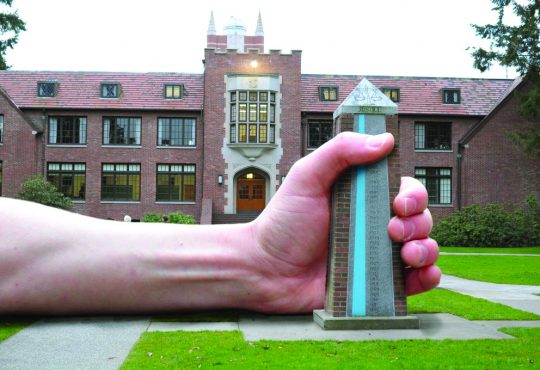The Supreme Court has recently heard a case concerning gender discrimination in Wal-Mart stores across the United States.
On Mar. 29 the class action suit—Wal-Mart Stores, Inc., v. Betty Dukes, Et Al.—was argued before the Supreme Court. While the case centers on gender discrimination in promoting and paying female employees, the main issue of this case is whether or not female Wal-Mart employees constitute a single class of people with the authority to sue a major corporation.
“Every store, the District Court found… managers are provided with the same level of discretion. But the company also has a very strong corporate culture that ensures that managers, not just with respect to the practices we’re challenging, but in all respects, what they call the Wal-Mart way, and the purpose of that is to ensure that in these various stores that, contrary to what Wal-Mart argues, that these are wholly independent facilities, that the decisions of the managers will be informed by the value the company provides to these managers in training” the lead attorney for Dukes Joseph M. Sellers said in his oral argument.
This corporate culture that Sellers refers to grants discretion to managers at each individual Wal-Mart store concerning the promoting and paying of employees. The result of this, the respondents argue, is that this discretion causes women to have lower salaries and to be less likely to earn promotions.
Sellers argued that the Court should “direct Wal-Mart to provide for detailed criteria by which to make pay and promotion decisions that are job-related in a way that hasn’t been true up until now,” and “hold managers accountable for the decisions they make.”
The main argument that the petitioners used to discredit the respondents was to assert that there were too many differing experiences between the female employees from various stores all over the country.
In order to for the case to be a class-action lawsuit, the women suing Wal-Mart all must have similar experiences. According to Rule 23 (a) of the Federal Rules of Civil Procedure, the “claims or defenses of the representative parties are typical of the claims or defenses of the class.” Thus, the goal of the petitioners is to prove that the women did not share a “typical” experience and therefore cannot proceed with the class action lawsuit.
“So, it’s impossible to make these sweeping generalizations… there’s absolutely no way there can be a fair process here,” argued the lead attorney for Wal-Mart, Theodore J. Boutrous Jr.
In a statement released by Wal-Mart on Mar. 29 in Washington D.C., the company expressed its positive outlook on how the oral argument proceeded earlier in the day.
“We were pleased to be able to show the Court that Walmart had a strong non-discrimination policy in place well before the lawsuit was filed, and to illustrate the other flaws in the plaintiffs’ theories. Walmart is working hard every day to ensure more women are represented in our management ranks. We continue to have strong anti-discrimination policies in place, a strong record of advancement of women and we are always looking to be better,” stated Executive Vice President of People for Wal-Mart U.S. Gisel Ruiz.
In addition, many large corporations filed amicus briefs supporting Wal-Mart in this case. Locally, both Costco and Microsoft filed briefs.
The case will likely be decided sometime in June.






